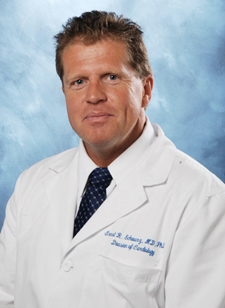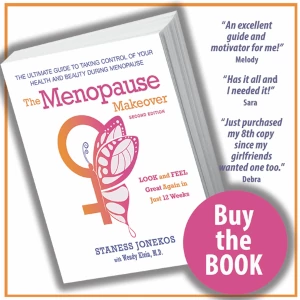
Heart disease is the number one killer of women today. Dr. Chrisandra Shufelt, assistant director of the Women’s Heart Center at the Cedars-Sinai Heart Institute, shares valuable information about heart disease during menopause.
Interview with Chrisandra Shufelt, M.D.
Assistant Director of the Women’s Heart Center
at the Cedars-Sinai Heart Institute.
1. Question: How can women approaching or experiencing menopause protect themselves from heart disease?
Chrisandra Shufelt, M.D.: The best protection is in knowing your heart health numbers. By that I mean you should know your blood pressure, LDL and HDL cholesterol, weight, body mass index (BMI) and fasting blood sugar level. If your numbers are out of whack, see your doctor, start exercising, change your eating habits, lose weight if you need to and stop smoking. You also need to be aware of your family medical history. Women who have a first-degree relative diagnosed with heart disease at an early age are at an increased risk of developing heart disease themselves. Heart disease is the number one killer of women so the first step in preventing it is to know your numbers.
2. Question: Does a woman’s heart disease risk increase during menopause?
Dr. Shufelt: One in seven premenopausal women die of heart disease compared to one in three postmenopausal women. We know that blood cholesterol levels can often change for the worse within six months to a year from the onset of menopause, which on average is the age of 51. The risk of high blood pressure triples with menopause; after the age of 55, more women have high blood pressure.
3. Question: Does hormone therapy increase a woman’s risk of developing heart disease?
Dr. Shufelt: Hormone therapy may be an effective way of controlling the moderate to severe night sweats, hot flashes and other menopause symptoms that can wreak havoc in a woman’s life. Start by seeking a certified menopause specialist who can weigh the risks and benefits for each patient. If your doctor considers hormone therapy safe for you, be sure to reevaluate annually. Starting hormone therapy many years after a woman has gone through menopause does increase the risk of heart disease. Women who are not good candidates for hormone therapy do not need to suffer in silence. There are many nonhormonal options to treat menopause symptoms.
4. Question: Are women who take oral contraceptives at an increased risk for cardiovascular disease?
Dr. Shufelt: Oral contraceptives are the most commonly prescribe hormones with approximately 80 percent of women in the U.S. using them at some point. In healthy younger women – young than 35 and nonsmokers – oral contraceptives do not increase a woman’s risk for heart disease. And we know that birth control pills can be helpful in controlling symptoms around perimenopause. That’s why you should re-read my answer to the first question and get to know your heart health numbers!
5. Question: Is it possible to treat menopause symptoms while simultaneously preventing heart disease?
Dr. Shufelt: Yes. That is exactly what we do at the Women’s Heart Center at the Cedars-Sinai Heart Institute. And it’s why menopause transition is such an important time for all women. I want women to know that when they reach menopause, it’s time to take stock of their health and their individual risk factors. Because when we know a patient’s numbers, we can help her assess the side effects and risks that come with all treatments and also help ensure that the second act of her life can be just as vibrant and active as the first.
6. Question: Does estrogen provide heart protection?
Dr. Shufelt: No, estrogen is not prescribed to prevent heart disease.
7. Question: What else should women know about heart disease?
Dr. Shufelt: When it comes to heart disease, women need to recognize that often, our symptoms are different from men’s heart disease symptoms. In addition to chest pain, women are more likely to have shortness of breath as a first sign of heart disease. Women more commonly experience extreme fatigue and persistent chest pain. Unlike men, women generally have major arteries that are clear of plaque, but the smaller coronary blood vessels cease to constrict and dilate properly, creating the lack of blood flow and oxygen to the heart.

 Dear Staness,
Dear Staness,
 Hot Flash 101
Hot Flash 101





 Dear Crabby,
Dear Crabby, Constantly Cranky in North Carolina
Constantly Cranky in North Carolina















